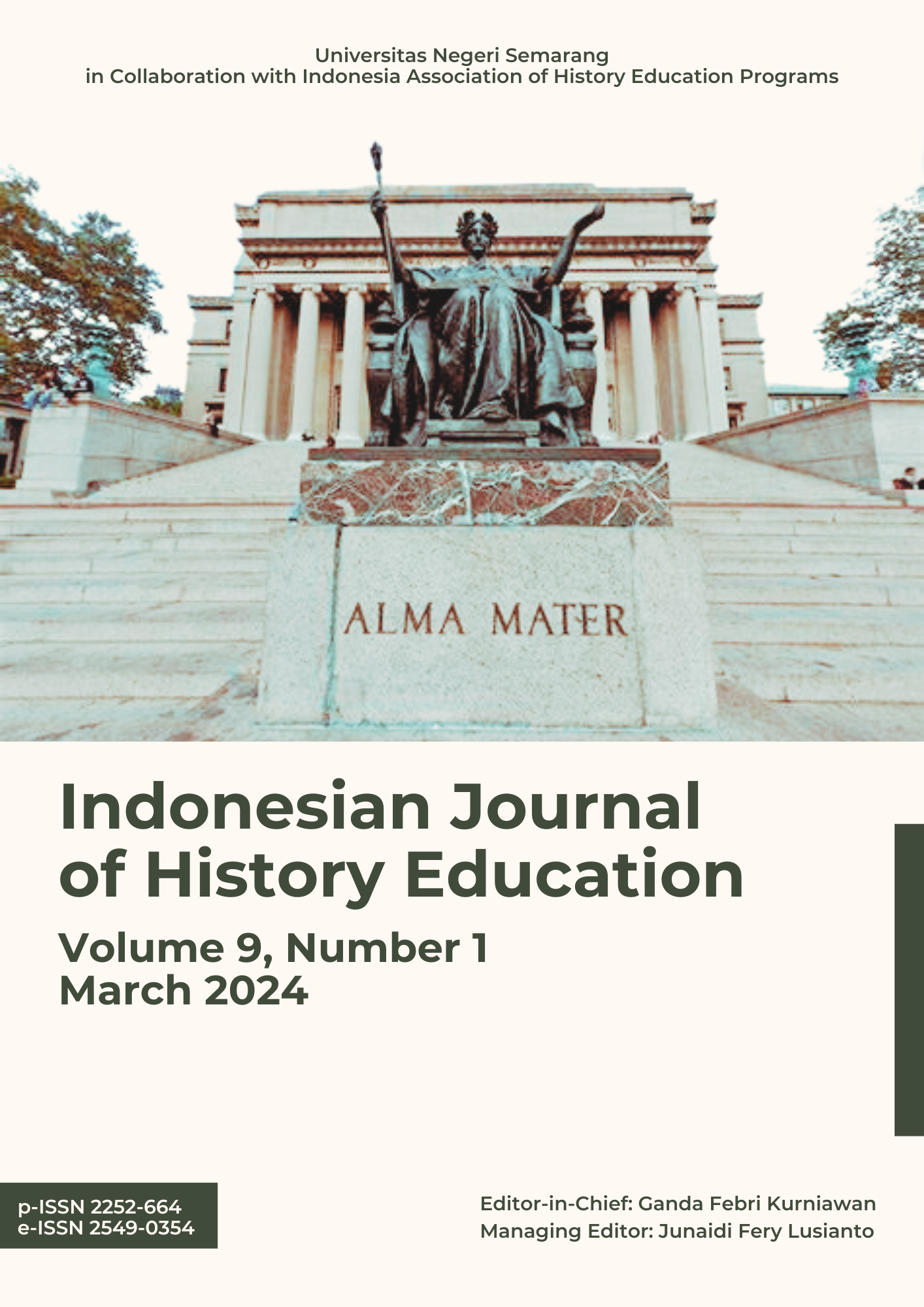Narrative Competence on Nationalism
Critical Studies of Independence Events in History Learning
Abstract
This research aims to analyze narrative competence on nationalism. This research uses qualitative research methods with a descriptive approach. This research was carried out at SMA Muhammadiyah 2 Semarang (a Senior High School) with class XI history teachers and several class XI students as informants. The data collection techniques used in this research are in-depth interviews, observation, and document review. Test the validity of the data using source triangulation and technical triangulation. The research results show; students have implemented the material on the history of the proclamation, however some students do not really know in depth about the events of the proclamation. Students feel happy in learning about the history of the Indonesian proclamation material. Students have shown nationalist attitudes at school and in everyday life, but there are students who feel that nationalist attitudes are normal. This research has limitations, namely the analysis at a single research location. The results of this research encourage future researchers to continue research on a broader scope.
References
Familus, F. (2016). Teori Belajar Aliran Behavioristik Serta Implikasinya dalam Pembelajaran. Pelita Bangsa Pelestari Pancasila, 11(2), 98–115. https://pbpp.ejournal.unri.ac.id/index.php/JPB/article/view/5161
Farhan Hidayat, M., & Purnomo, B. (2021). Pembentukan Karakter Nasionalisme Peserta Didik Melalui Ekstrakurikuler Hizbul Wathan. Jurnal Sejarah & Pendidikan Sejarah FKIP Universitas Jambi, 1(1), 1–15.
Hartati, Umi ; Refa’i, R. A. (2019). Masa Pendudukan Jepang di Indonesia Berbasis Nilai Karakter untuk Kelas XI SMA Negeri 1 Pasirsakti Umi Hartati dan Rizki Ahmad Refa’i Pendidikan Sejarah FKIP Universitas Muhammadiyah Metro Email : [email protected] Development Of Work Sheets (LKPD. 8(2), 70–83.
Jayusman, I., & Shavab, O. A. K. (2020). Aktivitas Belajar Mahasiswa Dengan Menggunakan Media Pembelajaran Learning Management System (Lms) Berbasis Edmodo Dalam Pembelajaran Sejarah. Jurnal Artefak, 7(1), 13. https://doi.org/10.25157/ja.v7i1.3180
Juliyati, E. D. (2021). Peranan pembelajaran sejarah dalam penanaman nilai karakter nasionalisme. From https://osf.io/.
Lamato, Sinyo A; Sudrajat, A. (2016). Penanaman Kesadaran Sejarah Dan Sikap Nasionalisme Dalam Pembelajaran Sejarah di SMA Negeri 2 Banggai Sinyo. 12(1).
Lisnawati, A., Asyahidah, N. L., & Arifin, M. H. (2012). Peran Pembelajaran Sejarah dalam Pembentukan Karakter Bangsa. Prosiding Seminar Nasional Wong Cilik Peretas Karakter Bangsa, 6(1), 99–111.
Luthfiyanni, N. A., & Kumalasari, D. (2015). Orientasi Konformitas Atau Orientasi Dialog : Membangun. 2011, 306–311.
Mardiana, S., & Sumiyatun, S. (2017). Implementasi Kurikulum 2013 Dalam Pembelajaran Sejarah Di Sma Negeri 1 Metro. Historia, 5(1), 45. https://doi.org/10.24127/hj.v5i1.732
Nantara, D. (2022). Pembentukan Karakter Siswa Melalui Kegiatan di Sekolah dan Peran Guru. Jurnal Pendidikan Tambusai, 6, 2251–2260.
Ngaba, A. L., & Taunu, E. S. H. (2021). Peranan Organisasi Siswa Intra Sekolah (Osis) Dalam Pembentukan Karakter Siswa Sma Negeri. Satya Widya, 36(2), 125–132. https://doi.org/10.24246/j.sw.2020.v36.i2.p125-132
Nihayah, S., & Adi, A. S. (2014). Penanaman Nasionalisme Pada Siswa Madrasah Aliyah Negeri 1 Bojonegoro di Tengah Arus Globalisasi. Kajian Moral Dan Kewarganegaraan, 3(2), 829–845.
Rochmat, S., & Trisnawati, D. (2017). Penanaman Nilai-Nilai Nasionalisme dalam Pembelajaran Sejarah di SMA Negeri 2 Wates, Kulon Progo. ISTORIA Jurnal Pendidikan dan Ilmu Sejarah, 13(2).
Sayono, J. (2013). Pembelajaran Sejarah Di Sekolah: Dari Pragmatis Ke Idealis. Jurnal Sejarah Dan Budaya, 7(1), 9–17. http://journal.unnes.ac.id/sju/index.php/ijhe%0APENGARUH
Sermal, & Barkara, R. S. (2019). Pendidikan Karakter dalam Pembelajaran Sejarah untuk Meningkatkan Sikap Nasionalisme Siswa SMA Kota Padang. Seminar Nasional Sejarah Ke 4 Jurusan Pendidikan Sejarah Universitas Negeri Padang, 246–253.
Sidiq, U., & Choiri, M. M. (2019). Metode Penelitian Kualitatif di Bidang Pendidikan. In Journal of Chemical Information and Modeling (Vol. 53, Issue 9).
Suseno, yoyok eko. (2013). Perbedaan Persepsi Antara Siswa Sekolah Negeri Dan Swasta Terhadap Pembelajaran Guru Pendidikan Jasmani 59. Jurnal Pendidikan Olahraga Dan Kesehatan, 59–63.
Suswandari, M. (2021). Peran Guru Menstimulus Respon Siswa Melalui Teori Belajar Behavioristik Teacher’S Role Stimulates Students’ Response Through Behavioristic Learning Theory. Absorbent Mind: Journal of Psychology and Child Development Avaliable, 1(1), 47–55.
Widiatmaka, P. (2016). Pembangunan Karakter Nasionalisme Peserta Didik Di Sekolah Berbasis Agama Islam. JPK (Jurnal Pancasila Dan Kewarganegaraan), 1(1), 25–33. http://journal.umpo.ac.id/index.php/JPK/article/view/301.
Copyright (c) 2023 IJHE

This work is licensed under a Creative Commons Attribution 4.0 International License.
Copyright Notice
An author who publishes in the Jurnal Indonesian Journal of History Education agrees to the following terms:
- Author retains the copyright and grants the journal the right of first publication of the work simultaneously licensed under the Creative Commons Attribution-ShareAlike 4.0 License that allows others to share the work with an acknowledgement of the work's authorship and initial publication in this journal
- Author is able to enter into separate, additional contractual arrangements for the non-exclusive distribution of the journal's published version of the work (e.g., post it to an institutional repository or publish it in a book) with the acknowledgement of its initial publication in this journal.
- Author is permitted and encouraged to post his/her work online (e.g., in institutional repositories or on their website) prior to and during the submission process, as it can lead to productive exchanges, as well as earlier and greater citation of the published work (See The Effect of Open Access).
Read more about the Creative Commons Attribution-ShareAlike 4.0 Licence here: https://creativecommons.org/licenses/by-sa/4.0/.




